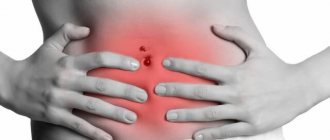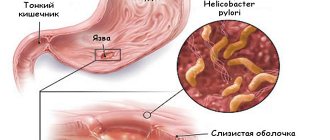Main signs and symptoms
A rumbling stomach in a child is usually accompanied by a number of symptoms. The signs are typical for a newborn; his body is just adapting to new food. Pay special attention to what is happening when you see the symptoms:.
- The baby's stomach hurts when you press it, and his legs tighten.
- Anxiety, the baby refuses to eat. Unmotivated whims.
- Restless sleep. The child sleeps little and often wakes up at night. The day begins exclusively with crying.
- Gas formation, bloating. Loose stools with a greenish color.
If your baby has trouble falling asleep in the crib, sleeping together with his mother will help. It is important not to overdo it, it will be difficult to wean off.
Causes of rumbling in the stomach
What are the causes of rumbling in the tummies of babies, and why does this happen in a newborn, can be explained by the following phenomena that have the presented effect:
- Peristalsis. As soon as the baby has eaten, his digestive system immediately begins to digest the food. Intestinal motility increases, which is why rumbling occurs, and the child feels discomfort in the tummy.
- Change of food . When a baby eats only breast milk, and then the mother starts giving him formula, changes begin in the intestines. The formulas consist of goat and cow's milk, so additional enzymes are required for their absorption.
- Lactose . It is present in all dairy products fed to children. This is milk sugar, for the processing of which special enzymes are produced in the digestive system. Up to 3-4 months, disorders occur in its synthesis, and the digestive system has difficulty coping with lactose, so the baby has colic.
- Colic . Since the digestive system has not yet formed and air is swallowed during feeding, colic occurs in newborns. They begin in most cases after feeding. Gases accumulate in the intestines, which press on the walls of the abdomen and bring pain and suffering to the baby.
- Microflora . At the beginning of a child’s life, the composition of the microflora in the intestines is formed. His sterile body is inhabited by microorganisms. These are beneficial lactobacilli and bifidobacteria, as well as conditionally harmful bacilli, streptococci and others. If there are more harmful microorganisms, then the newborn’s stomach begins to rumble and gurgle. This is complicated by the development of dysbiosis, but this can only be determined by testing. To do this, you need to consult a pediatrician.
- Accumulation of gases in the intestines . It occurs due to the mother’s consumption of foods that cause increased gas formation, as well as when the baby’s body experiences a lack of fluid.
- Hungry rumbling . Small children may have a rumbling stomach due to hunger. At the same time, he cries a lot and screams loudly; he urgently needs to be fed.
When rumbling in a baby’s stomach begins during feeding, this is normal – it means that the digestion process has begun. If these symptoms occur half an hour or more after feeding, then this indicates problems with digestion. To independently identify the presence of pathology, you need to pay attention to the following:
- time of symptom onset;
- simultaneous rumbling with gases or not;
- are there any changes in bowel movements;
- does the baby have colic?
- Is your appetite reduced?
Only a doctor can answer exactly why a child’s stomach is seething, through research. Based on the data obtained, having identified the cause, he can prescribe the correct treatment.
Reasons why the tummy “talks”
When digesting food, a child's body can make different sounds. To understand why your baby’s tummy is grumbling, you need to understand the reasons that caused this condition. A common cause is swallowing air during feeding. The milk flows heavily and the baby does not have time to swallow it or takes the breast incorrectly, which leads to swallowing air. This is one of the possible reasons, but grumbling also develops through other sources.
The baby is hungry
The reason why your tummy growls is because your stomach is empty. You will know that your baby is hungry by crying. In the first year of life, only in this way does the baby conduct a dialogue. Every adult has experienced a bubbling sound in the abdomen when hungry.
If your baby's stomach begins to gurgle, you need to feed him. Mother's milk is a common healthy and nutritious food for a newborn. After feeding, the stomach calmed down, and the baby did not cry, which means the reason was hunger.
Colic in the tummy
If the baby cries after breastfeeding, the problem is colic. The intestines of a one-month-old baby are sterile. There are no bacteria in the baby's stool. With the first feeding, the body receives the first dose of milk, which improves the functioning of the microflora. Fermentation occurs and bloating appears. There is no need to panic; the body’s reaction is quite normal. No treatment is required, just peace of mind on the part of the parents. Colic usually goes away by six months.
Lactase deficiency
Lactase deficiency is one of the diagnoses given to every third newborn. The cause is a decrease or complete absence of lactase, an enzyme that breaks down milk sugar. Because sugar is not digested, fermentation occurs.
Lactose intolerance can cause pathologies:
- Diarrhea, the consequence will be dehydration.
- Weight loss due to eating disorders.
- Micronutrient deficiency leads to impaired absorption of substances.
- The protective function of the immune system decreases due to the forced refusal of natural feeding.
In the first months after the baby is born, the mother adjusts and monitors her own nutrition.
Products that provoke lactase deficiency:
- Protein from cereals. Avoid gluten-containing foods while breastfeeding.
- No preservatives or dyes.
- Spices and herbal preparations.
- Remove fermented milk products from your diet.
The pediatrician will prescribe a general blood and urine test. Based on the results, the recommendation will be to change feeding. Pharmacies sell milk formulas suitable for feeding babies with this diagnosis. It is important to remember that lactose intolerance is lifelong; it is necessary to monitor its content in products given to children.
Your doctor will recommend using enzyme supplements:
- Baby Doc.
- Lactazar.
- Lactase Baby et al.
Dysbacteriosis
Rumbling in the tummy during feeding, the stool becomes liquid and foamy - a harbinger of dysbacteriosis. Its development occurs due to a violation of the intestinal microflora. For normal functioning of the intestines, lacto- and bifidobacteria are required, which are responsible for the protective function.
Pathological bacteria multiply in the body, which leads to dysbacteriosis. A common cause is poor nutrition of the mother. The baby's body reacts to a set of new substances coming from the mother's milk. What foods can cause dysbiosis:
- Fatty food.
- Fried, stewed food.
- Nicotine, alcohol.
- Coffee, citrus fruits, chocolate.
Consumption of such products will lead to disruption of the intestinal microflora, but also to:
- Allergic dermatitis.
- Bronchial asthma.
- Decreased immunity.
- Chronic gastritis and colitis.
Before prescribing treatment, a stool test is performed. According to available data, the pediatrician prescribes treatment with drugs that normalize intestinal function.
Not enough enzymes
Frequent rumbling in infants occurs due to a lack of enzymes. The manifestation of this symptom occurs during the introduction of complementary foods. Digestion of food occurs due to certain enzymes produced by the body.
Due to the lack of one of the substances, food is not digested, an increase in gases and fermentation in the stomach occurs. There is a decrease in appetite, loose stools, nausea and vomiting in the child.
Enzyme deficiency is easy to correct. After a detailed examination, the doctor prescribes medications to replenish the missing substances:
- Food additives: Lactazar.
- Medicines of the enzyme group: Mezim forte, Pancreatin, Festal.
- To improve intestinal health: Hilak forte, Linex, Probifor.
- For gas and diarrhea: Bobotik, Espumisan Baby.
To prevent pain, the doctor will prescribe No-shpa, Drotaverine hydrochloride (an analogue of No-shpa).
Prevention measures
To save a newborn from a painful condition, you need to know and follow a number of simple rules.
Ways to prevent bubbling and bloating in a baby:
- It is correct to breastfeed your baby. You can consult a breastfeeding specialist about this.
- If the baby is bottle-fed, make sure that the nipple is firm and the hole in it is small.
- Hold the baby upright after feeding.
- Turn the baby onto his tummy 3-4 times a day. This helps strengthen muscles and facilitate the passage of gas.
- Massage, apply a diaper heated with an iron to the baby’s belly.
- Monitor the diet of a nursing mother. Use medications and antibiotics only as prescribed by a doctor.
Compliance with all these rules will help to avoid fussing and pain in the baby, his condition will improve, and the baby will become calmer.
How to provide first aid to a baby?
The first step is to establish the reasons why the stomach rumbles during feeding and after. If the problem is colic, apply a warm cloth to the baby's tummy, ironed. Press your legs to your chest. After the manipulations, the baby will begin to calm down and fall asleep.
Walking around the room with the baby in your arms, singing songs to him, the mother’s voice has a calming effect on the nervous system. Place the baby on his tummy and do therapeutic exercises. Before going to bed, massage with smooth movements in a clockwise direction. Movements should be gentle in the navel area.
The famous pediatrician Komarovsky recommends doing the “bicycle” exercise with your child, this will help food pass better into the intestines. The doctor also advises placing the baby on his stomach more often and applying a warm heating pad. If the described remedies do not help, it is permissible to prepare dill water, chamomile solution, or a weak infusion of fennel.
Stomach growls: what to do?
If a baby’s tummy is rumbling and this is causing him suffering, then you should definitely help the baby. There are several ways to do this. Choose the one that is ideal for you and your child:
- Place your baby in an upright position and carry him like this for several minutes. If the cause of the rumbling is air swallowed during feeding, it will come out and the baby will feel better.
- Give your tummy a massage. Stroke the baby's abdominal wall in a clockwise direction. This will help relieve gases. After this, press the baby's legs to the tummy several times. Remember that you should not do gymnastics immediately after eating.
- Place something warm on your baby's tummy. This could be a heating pad or an ironed diaper. Warmth will ease the spasm and ease the suffering.
- Use medications. For rumbling in the stomach, you can give the baby the following formulations: “Espumizan”, “Bobotik”, “Smecta” and so on. In case of emergency, you can use No-spa tablets, but only after consulting a doctor.
Health to your baby!
Treatment
If your baby's tummy is constantly rumbling while breastfeeding, it's time to go to the doctor. Only a doctor will be able to conduct the necessary tests and prescribe appropriate treatment.
The occurrence of rumbling in the stomach of a newborn lies in the feeding process itself. A young mother should watch the baby take the breast and swallow air. The diet should be adjusted to prevent hunger in the baby.
Pediatricians recommend feeding often, but in small portions. At the same time, a woman needs to monitor her diet. You should eat properly and balanced; it is better to keep a food diary. Carefully select formulas when switching to artificial feeding; the child’s body must absorb them well. The introduction of goat's or cow's milk into complementary foods is allowed after 1 year.
If a two-month-old baby has difficulty digesting lactose in the body, eliminate it from the diet. It should be replaced with special food sold in pharmacies, after consulting with your doctor.
To eliminate disturbances in intestinal microflora, the baby will be prescribed probiotics and prebiotics. Drug treatment is used to eliminate the infection. To prevent dysbacteriosis, monitor the child’s diet, hygiene and keep the house clean. It is especially important when the baby begins to explore the world. Any treatment is carried out strictly under the supervision of a doctor.
Prevention of rumbling in newborns
To prevent constant churning in the baby’s stomach, parents should:
- do tummy massage and gymnastics every day - these methods not only improve digestion, but also strengthen the muscular system;
- monitor the mother’s diet if the baby is breastfed - the child’s body is sensitive to harmful foods, even half a hamburger or 100 ml of cola can cause significant harm;
- You need to feed your baby when he wants to eat, and not as written in the daily routine. Pediatricians do not recommend adhering to the rule of feeding by the hour.
During feeding, you need to ensure that the baby does not swallow too much air.
Rumbling in the stomach of a newborn baby is an inevitable process that occurs in most children. It can be caused by both harmless factors and some violations committed by parents. But getting rid of it is quite simple if you follow the doctor’s recommendations.
Ivanova Svetlana
General practitioner of the second category, transfusiologist, 29 years of experience
Diagnosis and treatment of problems with the musculoskeletal system (lower leg) and abdomen.
- pain and discomfort in the abdomen;
- bruises and injuries of the lower leg;
- cough, chest pain;
- acute respiratory infections, ARVI;
- food poisoning;
- cold;
- runny nose;
- general malaise;
- headache;
- aching joints;
- elevated temperature.
- Diploma in the specialty “General Medicine (Treatment and Prevention)”, Chuvash State University named after. I.N. Ulyanova, Faculty of Medicine (1990)
- Internship in the specialty “Selected Issues of Therapy”, Kazan State Medical Academy (1996)
Refresher courses
- “Nephrology issues for therapists”, State Institute for Advanced Training of Physicians named after V.I. Lenin (1995)
- “Therapy”, Kazan State Medical Academy (2001)
- “Transfusiology”, Russian Medical Academy of Postgraduate Education of the Ministry of Health of the Russian Federation (2003)
- “Therapy and Pulmonology”, St. Petersburg Medical Academy of Postgraduate Education of the Federal Agency for Health and Social Development (2006)
- “Transfusiology”, St. Petersburg Medical Academy of Postgraduate Education of the Federal Agency for Health and Social Development (2007)
- “Transfusiology”, Institute for Advanced Medical Studies of the Ministry of Health and Social Development of Chuvashia (2012)
- “Therapy”, Institute for Advanced Medical Studies of the Ministry of Health and Social Development of Chuvashia (2013)
- “Therapy”, Peoples' Friendship University of Russia (2017)
Place of work: MedCenterService clinic on Kurskaya
A newborn baby requires constant attention and care. Caring parents immediately notice if their child has any problems. One of the common problems is rumbling in the baby's stomach. In most cases, this is not dangerous, and parents can cope with this phenomenon on their own, but in some cases, the help of doctors may be required. In order to correctly assess the situation and take appropriate measures, you need to know the reasons for the rumbling in the baby’s stomach.
Preventive actions
Taking simple preventive actions will help avoid colic and rumbling in your baby’s tummy.
- Get a massage. Simple massage movements will help remove gases and improve bowel function.
- Gymnastics. Start doing gymnastics with your child. Exercise “bicycle”, pulling the legs to the chest, exercise “birch tree” in a lightweight version. This will help normalize abdominal function and strengthen the immune system. The child will be accustomed to physical education from the cradle.
- Feed when you're hungry. The time when children were fed by the hour is over. Pediatricians advise starting feeding on demand. Observe how the baby eats and takes the breast, do not allow air to be swallowed. The newborn should burp air after each feeding procedure. Feed without haste.
Don't be afraid to ask your pediatrician about your concerns. The more you learn and ask questions, the more answers you will receive. Forewarned is forearmed.











